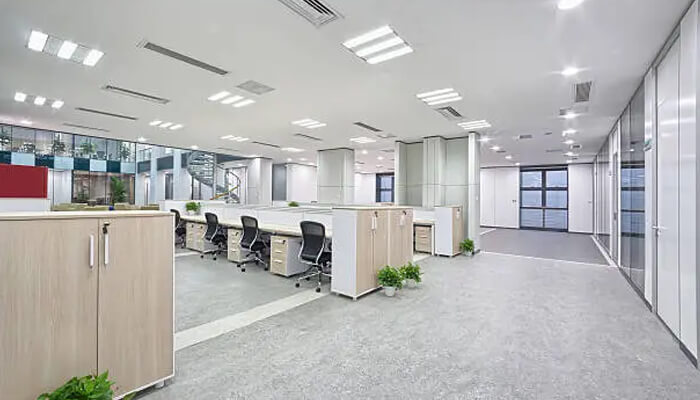When you need to install or replace the flooring in your client-facing office, you may find you have more options than you expected. Hardwood, vinyl, carpet, and even concrete can be an appropriate choice for most offices, so you need to weigh the pros and cons of each type.
5 Steps to Take Before Choosing the Right Flooring Type
When choosing flooring for a client-facing office, there are several factors to consider, like style, function, and durability. Here are some tips to help you choose the right flooring for your office.
Step 1: Consider the Style and Aesthetic of Your Office
The flooring you choose should match the overall style and aesthetic of your office, and should reflect your brand and identity. If you’re going for classy, then choose from a wide selection of hardwood flooring types. If you’re a more fun-loving office, pick a vinyl floor in a unique pattern.
Step 2: Think About Durability and Maintenance
The flooring in a client-facing office should be durable and easy to maintain, as it will likely see a lot of foot traffic and may need to be cleaned frequently. Durable flooring types include ceramic tile, hardwood, and laminate. All three floor types are easy to maintain, refinish, and clean.
Step 3: Take the Function of the Space Into Account
The type of flooring you choose should be suitable for the specific function of the space. For example, a reception area may need a more durable and stain-resistant flooring type than a private office. Kitchen areas need water-resistant flooring types, like vinyl (LVT) or linoleum.
Step 4: Calculate the Cost and Budget
The flooring you choose should be within your budget and must provide a good return on investment. Low-cost flooring types, like vinyl, concrete, ceramic tile, and laminate, will give you a high return on investment. High-cost flooring types look nice but need to be replaced often.
Step 5: Weight the Pros and Cons of Each Type
Now that you know how to weigh your options, it’s time to look at each flooring type individually. Use everything you learned about flooring costs, durability, and function, and pull it all together.
Here’s a chart that can help you narrow down your options:
| Flooring Type | Pros | Cons |
| Hardwood | Strong, durable, can be refinished, easy to clean, easy to maintain | Often noisy, prone to scratching and scuffing, expensive |
| Carpet | Improves air quality, reduces sound, inexpensive, varied | Needs to be maintained, prone to staining, not fit for all areas |
| Concrete | Customizable, affordable, good for high-traffic areas, low-cost, | Prone to mold and mildew, hard to stand on, won’t fit with all aesthetics |
| Vinyl | Low cost, varied, low maintenance, water resistant | Easy to tear, dent, or gouge, often made with plastic, dulls easily |
| Ceramic Tile | Inexpensive, lost-lasting, durable, offers a unique look, replaceable | Can chip or crack, hard to clean, slippery when wet, must be glazed |
| Natural Stone | Classy, stylish, easy to repolish if scratched, simple to clean | Very expensive option, porous, must apply sealant, can be cracked easily |
| Rubber | Quiet to walk on, resilient and hard to scratch, very low maintenance | Somewhat expensive, slippery, has a duller finish, discolors easily |
| Laminate | Low cost, durable, difficult to scratch, good for high-traffic areas | Can’t imitate other flooring types, prone to mold, can’t be refinished |
In the end, you need to select an option that works for your employees and your customers.
For example, a carpeted office would be ideal for employee workspaces, whereas natural stone can show off the elegance of your brand to customers. Concrete can even work if you’re going for a more industrial look, whereas rubber would be perfect for a client-facing fitness center.
Most offices mix and match flooring types for variety and to get the most out of their budgets.




